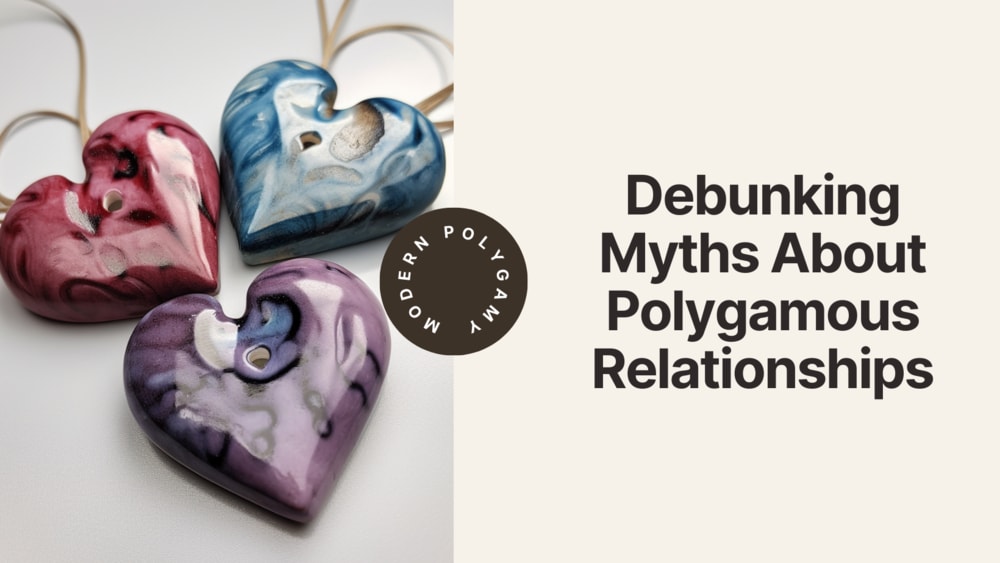

Debunking Myths About Polygamous Relationships

When it comes to polygamous relationships, there are many misconceptions and myths that need to be addressed. For those who are unfamiliar with the term, polygamy refers to the practice of being married to more than one person at the same time. This article aims to debunk some of the most common polygamy myths and provide a more accurate understanding of these unique relationship structures. By breaking down stereotypes and promoting understanding, we can foster a more open-minded and respectful attitude toward diverse relationship models.
Polygamy is a broad term that encompasses various types of relationships involving multiple spouses. There are two main forms of polygamy: polygyny and polyandry. Polygyny refers to a relationship where a man has multiple wives, while polyandry is the practice of a woman having multiple husbands. Both of these relationship structures fall under the larger umbrella of polygamy, but it is important to note that they are distinct from one another.
With the growing visibility and acceptance of diverse relationship models, it is important to debunk polygamy myths and foster a more accurate understanding of polygamous relationships. Doing so can help reduce stigma and discrimination, while also providing valuable information to those who may be considering entering a polygamous relationship. By dispelling common misconceptions, we can create a more inclusive society that recognizes and respects the diverse ways people choose to form loving relationships.
Myth 1: Polygamy is all about sex

One of the most pervasive polygamy myths is that polygamous relationships are solely about sex. While sexual compatibility and desire are certainly factors in any romantic relationship, they are not the sole driving force behind polygamous partnerships. Just like in monogamous relationships, love, emotional connection, and compatibility are at the heart of polygamous unions. In fact, many polygamists emphasize the importance of building strong emotional bonds and maintaining open communication with all partners in the relationship.
It is important to understand that polygamous relationships are consensual and based on open communication. All parties involved in the relationship are aware of and agree to the arrangement. This distinguishes polygamy from cheating or infidelity, where one partner engages in extramarital relationships without the knowledge or consent of the other partner. In polygamy dating, all partners prioritize communication and honesty to ensure the emotional and physical well-being of everyone involved.
Myth 2: Polygamist relationships are inherently unequal
Another common myth surrounding polygamy is that it is inherently unequal, with one partner having more power or control over the others. While it is true that power dynamics can exist in any relationship, polygamous or monogamous, it is essential to recognize that many polygamist relationships prioritize equality and fairness. The key to maintaining balance in these relationships is open communication, negotiation, and mutual respect among all partners. Each person's needs and desires are considered, and decisions are made collectively to ensure that everyone's well-being is taken into account.
It is crucial to differentiate between consensual power dynamics and non-consensual, abusive situations. In healthy polygamist relationships, all partners voluntarily enter into the arrangement and have the ability to express their needs, desires, and boundaries. Consent is an ongoing process, and all parties must be open to renegotiating the terms of their relationship as needed. Any relationship, whether polygamous or monogamous, can be unhealthy or abusive if it lacks open communication, respect, and consent.
Myth 3: Polygamous people cannot commit or be loyal

One of the most widespread polygamy myths is that people in polygamous relationships are incapable of committing to their partners or being loyal. This assumption is both unfair and inaccurate. Polygamous individuals can and do commit to their partners just as much as monogamous individuals do. The difference lies in the fact that their commitment is extended to multiple partners rather than just one. In many cases, polygamous relationships are built on a strong foundation of trust, loyalty, and dedication to the well-being and happiness of all partners involved.
Polygamist relationships, like any other relationship, involve agreements and boundaries that all parties agree to uphold. These agreements can include things like the level of emotional and physical intimacy shared with each partner, the amount of time spent together, and the division of responsibilities within the relationship. By respecting and adhering to these agreements, polygamous individuals demonstrate their commitment and loyalty to their partners.
Myth 4: Polygamy is only for religious reasons
While it is true that polygamy has been practiced in various religious and cultural contexts throughout history, it is not exclusively a religious practice. Polygamous relationships have existed in many different societies and cultures, sometimes for reasons related to resource management, family structure, or social standing. It is essential to understand that polygamy is not limited to any specific religion or culture.
Today, many people choose to engage in polygamous relationships for reasons that are unrelated to religious beliefs. These individuals may be drawn to polygamy for a variety of reasons, such as a desire for increased emotional support, the opportunity to explore diverse connections, or personal preferences in relationship dynamics. The decision to enter a plural relationship is a deeply personal one, and it is crucial to respect the choices of those who opt for this relationship model, regardless of their religious or cultural background.
Myth 5: Children in polygamous families are confused or neglected

A common misconception is that children raised in polygamous families are confused or neglected due to the presence of multiple parental figures. However, research has shown that children from polygamous families can develop strong, healthy relationships with their parents and caregivers, just as children from monogamous families do. In many plural marriages, parenting roles are shared among the adult partners, providing children with a larger support network and a variety of nurturing relationships.
Children in polygamist families can actually benefit from the additional support and resources provided by having multiple parental figures. This support can include increased emotional connection, more diverse perspectives on problem-solving, and a broader range of experiences and skills that can be shared with the child. Additionally, the larger support network can help with practical matters, such as sharing childcare responsibilities or providing financial stability. It is important to remember that the quality of a child's upbringing depends on the love, care, and guidance they receive from their caregivers, regardless of the number of parents involved.
Myth 6: Polygamy is illegal and unethical
While it is true that plural marriage is illegal or simply not recognized in many countries, most first world countries recognize a person's right to be in a relationship with whomever they desire. In some regions, plural marriage is legally recognized and regulated. It is essential to recognize that the legal status of plural marriage is a complex issue and is often influenced by a variety of historical, cultural, and social factors.
As for the question of ethics, it is important to consider the principles of consent and autonomy when discussing polygamous relationships. In a healthy polygamous relationship, all parties involved are consenting adults who have chosen to enter into the arrangement voluntarily. When everyone involved is acting with respect, honesty, and consideration for the well-being of their partners, polygamy can be an ethical relationship model.
Conclusion
By debunking common polygamy myths, we can help to break down stereotypes and foster greater understanding and acceptance of diverse relationship models. It is crucial to recognize that polygamous relationships, like any other type of relationship, can be healthy and fulfilling when they are built on a foundation of love, trust, and open communication. Rather than making assumptions or judgments, let us strive to understand and respect the diverse ways in which people choose to form loving connections with one another.
In a world where relationships come in many different forms, it is important for us to approach the topic of polygamy and other alternative relationship models with an open mind and a willingness to learn. By fostering an environment of respect and understanding, we can help to create a more inclusive society that values the diverse ways people choose to connect with one another. Whether you are in a monogamous or polygamous relationship, let us all strive to support and uplift one another as we navigate the complex world of love and human connection.
